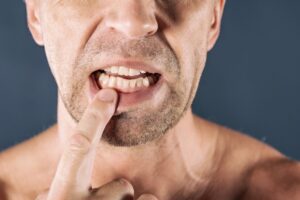Do you grind your teeth as you sleep? Millions of people exhibit this behavior, and many do not even know that they do it because they are asleep when it happens. However, you might not realize how harmful chronic teeth grinding, also known as bruxism, can be for your teeth.
The constant grating of the top teeth against the bottom teeth creates abnormally high pressure that will damage your teeth irreversibly over time. So do not delay consulting your dentist about the best way to protect your teeth from this behavior when you are not awake to stop it on your own. Your dentist might recommend wearing a night guard to cushion against high pressure from bruxism as you sleep.
You can feel more encouraged to talk to your dentist when you know about the risks that teeth grinding can pose for your oral health. Read on to learn about three dental complications that may arise if you do not seek treatment for chronic bruxism.

Dental Erosion
Your teeth feature a hard outer layer called enamel that protects the vulnerable interior of your teeth as you chew and tear into food while eating. Though durable, the enamel might suffer damage under high pressure, such as when you grind your teeth.
Over time, bruxism may cause the enamel to wear down, weakening your teeth. This can allow oral bacteria to penetrate your teeth. Then you can face a greater risk of tooth decay, infections, and other serious dental issues.
Once damaged, enamel cannot heal or regrow on its own. You will need to seek restoration and replacement from your dentist to repair your teeth. So you should address underlying issues that cause this problem, like teeth grinding, to avoid costly damage.
Tooth Breakage
As mentioned, chronic teeth grinding can lead to dental erosion. However, the excess pressure of bruxism can also lead to a dental injury. Constant grinding can cause tooth wear and make a tooth chip or crack. Not only could this cause cosmetic damage to your mouth, but it also makes your teeth more vulnerable to serious problems.
If you break a tooth, you should seek prompt treatment to fix it. A fractured tooth can cause significant pain and other oral health complications. Prevent tooth breakage by treating bruxism as soon as you can.
TMJ Disorders
If you have bruxism, you exert pressure on your teeth, but this can radiate down to your gums and your jaw. This puts strain on the surrounding muscles and tissue which can lead to chronic pain. You might also develop temporomandibular joint disorders or TMJ.
The disorder in the jaw joint signifies inflammation in this part of the jaw that can feel painful and stiff and impact your oral function. Prevent these uncomfortable symptoms that will require treatment from your dentist by addressing teeth grinding and other factors. Find TMJ treatment and preventive oral health care by visiting your dentist today.
